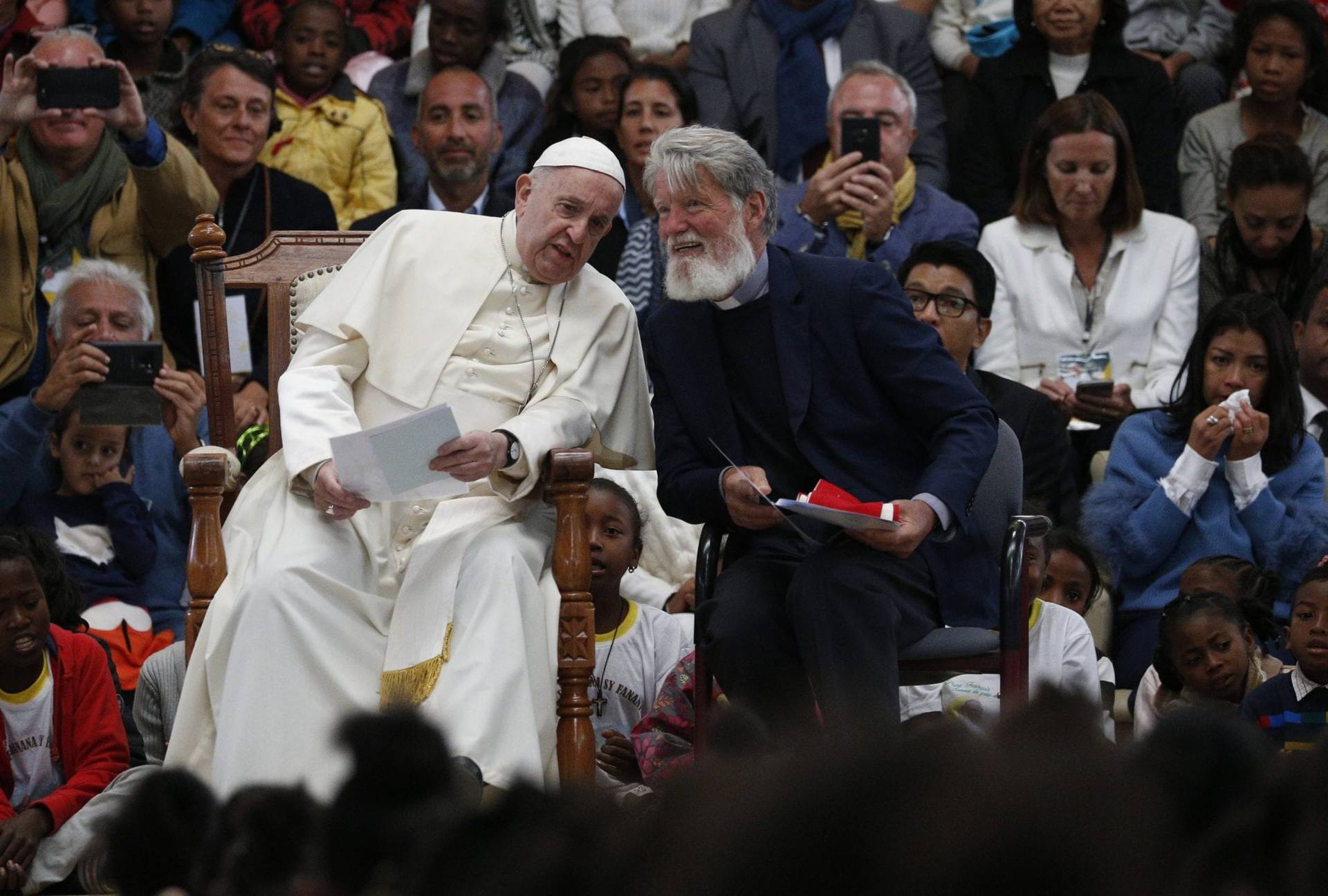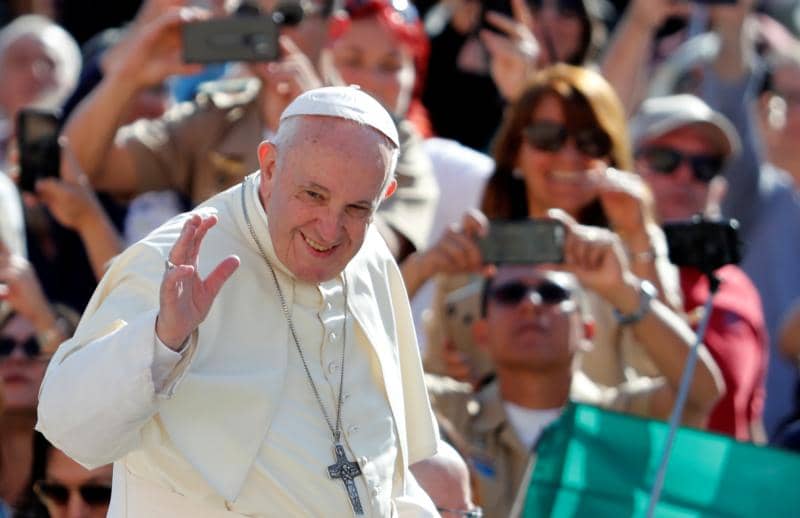ABOARD THE PAPAL PLANE – In response to a question about his recent declaration that he’s honored when “Americans are attacking me,” Pope Francis said Tuesday that while he prays to avoid a schism in the Catholic Church, he’s not afraid of it either, because such rifts have occurred throughout history.
Francis also acknowledged that the U.S. is hardly the only place from which he occasionally draws fire, noting that he also has some critics within the Roman Curia, meaning the administrative bureaucracy of the Vatican itself.
Further, Francis also said that criticism isn’t always destructive, especially when it’s delivered in the open rather than behind one’s back.
“On the question of schism … In the Church, there have been many,” Francis said, giving the example of ruptures that followed the First and Second Vatican Councils, including one led by the traditionalist Archbishop Marcel Lefebvre, founder of the Society of St. Pius X.
“There always is the schismatic option in the Church,” Francis said. “It’s a choice that the Lord leaves to human freedom. I am not afraid of schism … I pray for them not to happen, as the spiritual health of many people is at stake.”
The pope also said that he prays for dialogue, because the “path of schism is not Christian.”
Francis then said that it’s the people of God who ultimately save the Church from schism, because all such movements have one thing in common: “They’re a split from the people, from the faith of the people, from the people of God.”
A schism, Francis said, is an ideology that can sometimes have a point, but which “enters into doctrine and splits it apart.”
Francis’s remarks came as he answered questions from the nearly 70 journalists who traveled with him during his Sept. 4-10 visit to Mozambique, Madagascar and Mauritius.
The question about schism was posed by English-speaking journalists about his comments on the Sept. 4 flight to Maputo, Mozambique, when he told a French journalist that he’s “honored” by the criticism he receives from some quarters within the American Church. The journalist, Nicolas Seneze, handed the pope a copy of his new book How America Wanted to Change the Pope, which hasn’t been released in English.
The pope began his response by saying that “criticism is always helpful,” and that when one receives a criticism, it’s important to ask if it’s true or not. Criticism, he said, can sometimes cause anger, but there’s always something to learn from it.
The pope swiftly observed that Americans aren’t his only critics.
“Criticism comes not only from the Americans, they’re coming from all over, including the Curia,” he said.
Francis also praised those who criticize him to his face, “having the honesty of saying” their objections out loud. “I don’t like it when criticism is done under the table… when they smile and then stick the knife from behind. This is not loyal.”
Criticism, he insisted, can be a constructive tool. When a person issue a criticism that isn’t fair, the pope said, he or she should be ready for a response and to dialogue about it.
On the other hand, Francis said, a critic who cloaks his or her objections behind a façade is “an arsenic pill, a bit like throwing a stone and hiding your hand. This doesn’t help, and it comes from closed [minded] people who don’t want to hear the answer.”
When it comes to criticizing the pope, he said, “saying what you don’t like, writing an article and asking for a response, this is loyal. This is loving the Church. Instead, voicing a criticism without dialogue [and] without wanting an answer, is not loving the Church … [it’s to want to] change the pope, make a schism.”
Answering the same question, Francis said that those who criticize him for following the Second Vatican Council and for speaking about social issues, “saying [the same] things John Paul II said,” and who label him as “a bit communist,” are injecting ideology into doctrine, “and that’s when schism occurs.”
“Today we have pockets of rigidity, which aren’t a schism, but they’re semi-schismatic ways of life that will end badly,” the pope said. He added that bishops, priests and lay people who are “rigid” lack the “health” of the Gospel.
On the three countries he visited
Francis said that he was particularly moved by the “joy” demonstrated by the people he encountered in the three nations, particularly in Madagascar, where close to a million people took part in the Mass he celebrated on Sunday, despite sporadic rain and also despite that, due to their poverty, most hadn’t eaten since the previous afternoon.
“I felt humbled, small, facing this popular goodness,” he said.
Those who lose that sense of people, community, Francis argued, lose their happiness, because they lose the ability to see reality through the lenses of those who are around them, as a reminder that despite the challenges they might face, they’re not alone.
“I was touched by the children… who would greet me, because they too were participating in the joy,” passed onto them by their parents.
Francis underlined the “respect for religious identity” he encountered in the three countries, particularly in Mauritius and in Mozambique, where he took part in an interreligious youth gathering for peace. He said he was moved by the friendship among religions he found in Mauritius, underlining that Christians, Muslims and Hindus can work together.
As he’s done before, he warned against proselytism, saying that that’s something for political parties or sports teams but not for religion.
“Someone can say, pope, what does it mean for you to evangelize?” the pontiff said. “There’s a phrase by St. Francis that I like: Preach the Gospel, and, if needed, use words.”
Evangelization, he said, is to be done by example, and only when one is asked where their attitude comes from should one talk about faith. The protagonist of evangelization, Francis said, is not the individual Christian but the Holy Spirit.
“When you see religious proposals on the path of proselytism, that is not Christian,” he said, noting that in Mauritius, there’s an understanding among the followers of different religions that they’re all brothers.
Francis also said he was moved by the fact that as he passed by in the popemobile, adults would try to show him their children, as if to say, “this is my treasure, my joy, my pride, my triumph.” He contrasted the “youth” of Africa with Europe’s aging population, noting that “mother Europe” is becoming “grandmother Europe.”
Asked about the United Kingdom’s and the United States’s refusal to return the island of Chagos, close to Mauritius and where the U.S. has a military base, to its original inhabitants, Francis said countries that acknowledge international organizations such as the United Nations are called to live up to their rulings.
The U.N.’s General Assembly voted earlier this year in favor of the locals, some 2,000 of whom were deported in the 1960s.
A message to journalists
Francis was also asked about growing xenophobia in Africa, saying it’s not a problem only on this continent, but a “human disease like measles.”
Xenophobia, he said, is a disease justified by “purity of race” and it rides on “political populism.”
Asked by Spanish journalists about the future of journalism, he said he doesn’t have a “crystal ball” and that he’s not an expert. However, he listed a series of values he believes journalists should have.
Communicators, he said, have to “transmit facts,” clearly distinguishing things that have happened from the “narrative”. Communications, Francis added, must always be “humane” and help build, not destroy.
“It’s always key to distinguish the facts from the narrative,” he said. “This is what being objective is all about, and this is one of the values that the news industry needs to retain.”
Follow Inés San Martín on Twitter: @inesanma
Crux is dedicated to smart, wired and independent reporting on the Vatican and worldwide Catholic Church. That kind of reporting doesn’t come cheap, and we need your support. You can help Crux by giving a small amount monthly, or with a onetime gift. Please remember, Crux is a for-profit organization, so contributions are not tax-deductible.















